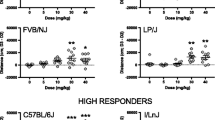Heading
Abstract
Rationale. At least 40,000 infants born each year in the U.S. are estimated to have been exposed to crack cocaine and, therefore, may be at risk for increased vulnerability to cocaine addiction.
Objectives. The present study tested the hypothesis that prenatal exposure to cocaine significantly increased subsequent cocaine-taking behavior in mice.
Methods. Swiss Webster male mice that had been exposed to cocaine in utero were tested at 5 months of age in the cocaine self-administration paradigm. They were the offspring of dams that received one of the following treatments during gestation days 8–17: cocaine (40 mg/kg or 20 mg/kg per day; COC40 and COC20 mice, respectively), saline with access to food ad libitum (SAL mice), or saline with access to food restricted to that of the COC40 dams (i.e., pair-fed; SPF40 mice). Mice were initially trained to lever press for a condensed-milk solution, were implanted with an indwelling intravenous (i.v.) catheter and, subsequently, allowed to self-administer cocaine (0.25, 0.5, 1.0, or 2.0 mg/kg per injection) under a fixed ratio (FR) 1 schedule of reinforcement.
Results. Latency for acquisition of food-reinforced responding appeared to be independent of prenatal treatment, as was acquisition of cocaine self-administration, which was found to be dose dependent. Both COC40 and SAL mice reached cocaine self-administration criteria at 1.0 mg/kg or 2.0 mg/kg per injection doses, while neither group did so at lower doses. It was also observed that, at each of the doses tested, a higher number of COC40 mice reached criteria for acquisition. A logistic regression analysis confirmed that the likelihood for acquiring cocaine self-administration was positively correlated to prenatal exposure to cocaine and the dose of cocaine tested.
Conclusions. These data provide evidence, for the first time, that prenatal exposure to higher doses of cocaine increase the probability of acquiring cocaine self-administration at moderate doses during adulthood and modulate vulnerability to cocaine-taking behavior in mice.
Similar content being viewed by others
Author information
Authors and Affiliations
Additional information
Electronic Publication
Rights and permissions
About this article
Cite this article
Rocha, B.A., Mead, A.N. & Kosofsky, B.E. Increased vulnerability to self-administer cocaine in mice prenatally exposed to cocaine. Psychopharmacology 163, 221–229 (2002). https://doi.org/10.1007/s00213-002-1140-0
Received:
Accepted:
Issue Date:
DOI: https://doi.org/10.1007/s00213-002-1140-0




